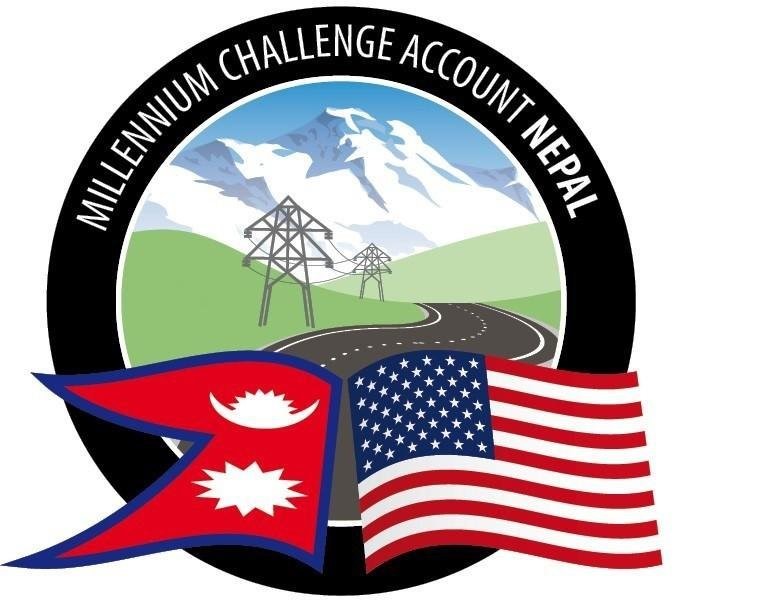How will the US-Nepal relations be affected if Nepal rejects the MCC compact? This query was put to Fatema Z Sumar, vice-president of the Department of (MCC) Compact Operation, who visited Nepal in September this year to press Nepali leaders for the compact’s early parliamentary ratification.
At the press meet, she sounded confident that bilateral relations would remain cordial with or without the MCC but said she was still optimistic about early ratification. Highlighting the age-old bilateral relations, she said: “The two countries have shared a special bond for more than 70 years. This partnership will endure long before and after the MCC… The MCC is one offer from the American people to grow the economy here.”
It has been over four years since the MCC compact was signed between the two countries but parliamentary ratification, a prerequisite for its implementation, is still in limbo. Though she did not set a deadline, she said, “It’s high time Nepal ratified the compact,” adding, “How long can we afford to wait [for it] to be endorsed?” As per the agreement, the compact should have come into force in 2019.
According to experts and people familiar with the MCC, even though bilateral relations may not suffer drastically over the compact’s failure, such an outcome will have consequences. As Sumer suggested, there is growing impatience on the American side over the delay. Issuing a press statement on October 29, the MCC headquarters again reiterated: “The delays to ratification jeopardize the critical and timely support this $500 million grant would provide to help more than 23 million Nepalis access reliable energy and safer roads. The decision whether to move forward with the compact now rests with Nepal.”

Similarly, Deputy CEO of MCC Alexia Latortue met PM Deuba on the sidelines of the C0P26 summit. Deuba asked Alexia to wait for some time for the MCC endorsement. On his return to Kathmandu, Deuba for the first time disclosed that he and Pushpa Kamal Dahal had both committed to the compact's endorsement. Dahal accepted sending a letter to the US to that effect but then added that he would still like to see the compact’s amendment before its parliamentary endorsement.
Mrigendra Bahadur Karki, Executive Director at the Center for Nepal and Asian Studies (CNAS), points out possible implications of the grant’s rejection. Karki says it will mark a great setback to the old bilateral partnership. If the MCC is snubbed, Nepal’s larger policy of diversifying its trade and economy beyond two neighbors will be as well. “Such a strategic failure will certainly have consequences,” he cautions.
Some economists also fear a spoiling of the environment for foreign investment, as investors think twice before coming to a country where development projects are excessively politicized.
Uma Shankar Prasad, an Associate Professor at the Central Department of Economics, TU, who is also a member of the National Planning Commission, however, does not subscribe to such views. “There has been an exaggerated debate in Nepal over the MCC,” he says. “I don’t think withdrawal of the MCC’s support, which is not a big amount, will have much of an impact on our overall investment climate.”
The MCC’s withdrawal may also have spillover effects on Nepal’s equation with China’s Belt and Road Initiative (BRI). Since signing a framework agreement in 2017, there has been a one-sided debate—that Nepal should unconditionally select projects under the no-strings-attached BRI. Karki says if the compact is canceled due to growing political polarization, it will trigger a debate on why the country should accept BRI and not the MCC. “In that case, it could be difficult to move ahead with the BRI as well, which is not good for Nepal,” he says.

China has not objected to the MCC projects in Nepal but reports from Chinese official media and think-thanks do suggest that the northern neighbor would like Nepal to maintain a distance from the MCC, which it sees as a part of the Indo-Pacific Strategy aimed at containing China. Now, there is little progress on both the MCC compact and as well as the BRI projects. Says Former Nepali Ambassador to the UK and US Suresh Chalise, the MCC and the BRI are inter-related and if one moves ahead the other one will as well.
But the chances of the compact’s ratification before the elections are slim as there are divergent views even inside the ruling coalition. Though Prime Minister Sher Bahadur Deuba wants the parliament to endorse the compact, two other senior leaders in the coalition, Pushpa Kamal Dahal and Madhav Kumar Nepal, are in favor of its endorsement only after requisite amendments.
Chalise says the compact’s implementation could pave the way for trilateral cooperation among Nepal, India, and Bangladesh on hydropower. His understanding is that India, which prefers bilateral cooperation with its neighbors, has agreed to trilateral cooperation only because the US is the third party. “We are ramping up electricity production and we need good transmission lines to sell electricity in the Indian and Bangladeshi markets. If the transmission line under the MCC is not built, we will suffer because there is a huge investment in the hydropower sector,” he says.
Indeed, a senior bureaucrat requesting anonymity says initially India was not in favor of building the Butwal-Gorkhapur transmission line and agreed to it only after the Americans entered the picture.
Also read: What if… the 2015 constitution had been delayed?
Some experts are of the view that as America has huge influence in multinational financial institutions, there could be some implications for Nepal there as well. The US won’t go to the extent of punishing Nepal even if it rejects the compact, says Chaise. “But America is a superpower. If it remains indifferent or silent on Nepal’s agenda in the international forum—that will most certainly affect us. On the other hand, if we gain its trust, it could speak in our favor.”
According to him, the US-Nepal bilateral relationship is far more important than the MCC compact or any other project.
Domestically, if the compact is rejected, the CPN (Maoist) and other fringe communist parties that are continuously opposing it are likely to gain from it electorally. The compact’s rejection would also signal the prevailing of communist narrative on Nepal’s foreign policy.
Expert opinion
What if MCC is not approved?
Chandra Dev Bhatt
In the past three-plus decades, interaction between Nepal and the US has increased to the extent that it has trickled down seamlessly to people-to-people level. Today many of our youths interact more with the US than the Nepali state itself, for multiple reasons. The most important is the failure to create opportunities for the educated youths and others within the country and in the neighborhood. Both ‘pull’ and ‘push’ factors have forced people to go outside and the US has become their number one destination.
The pull and push factors have created confusion as to how the state should craft its foreign policy. Whether it should follow societal needs or retain its traditional approach. The situation has become complicated with the MCC row. There are those who are in its favor. Others strongly oppose it yet would still like to benefit from other opportunities that America offers.
For many Nepalis, the US is increasingly becoming a second home. If the MCC Compact does not make it through, this definitely will have consequences even at the people-to-people level.
America, over time, has become an indispensable neighbor, albeit one with which we do not share our borders. If the Chinese and Indians are interacting with the US on multiple levels, why should not Nepal?












